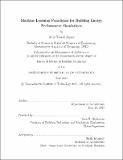Machine learning paradigms for building energy performance simulations
Author(s)
Aijazi, Arfa N. (Arfa Nawal)
DownloadFull printable version (7.492Mb)
Other Contributors
Massachusetts Institute of Technology. Department of Architecture.
Advisor
Leon R. Glicksman.
Terms of use
Metadata
Show full item recordAbstract
This research seeks to overcome a technical limitation of building energy performance simulations, the computation time, by using surrogate modeling, a class of supervised machine learning techniques where the output is a performance metric. Though early machine learning methods were introduced decades ago, the convergence of computation power, more data collection, and maturation of methods has led to an explosion in the types of problems machine learning can be applied to. A comparison of several common surrogate modeling techniques found that parametric radial basis functions and Kriging are highly accurate regression techniques for predicting building energy consumption. For a single climate, these regression techniques can predict the total energy consumption to within 2% of a detailed energy simulation, but in a fraction of a second, about five orders of magnitude faster. Integrating a Kriging surrogate model with multi-objective optimization, allowed for finding retrofit recommendations in Lisbon that are cost effective and can reduce the present-day energy consumption of an existing apartment by up to 20%. Similarly, integrating surrogate model with multi-objective optimization can find retrofit options in Boston that can reduce the present-day energy consumption and unmet hours in the future. Combined this body of works strives to add value to existing building energy performance simulation tools as more than just an exercise for code compliance but as a real design tool that can guide decision making.
Description
Thesis: S.M. in Building Technology, Massachusetts Institute of Technology, Department of Architecture, 2017. This electronic version was submitted by the student author. The certified thesis is available in the Institute Archives and Special Collections. Cataloged from student-submitted PDF version of thesis. Includes bibliographical references (pages 134-138).
Date issued
2017Department
Massachusetts Institute of Technology. Department of ArchitecturePublisher
Massachusetts Institute of Technology
Keywords
Architecture.